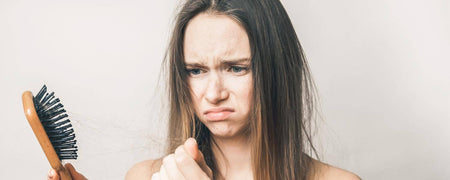3. Androgenic Alopecia
Unfortunately, hair loss is sometimes in the genes. This applies especially to men, where as many as 75% will experience genetic hair loss when they get older. For women, it is approx. 25% who suffer from genetic hair loss. So if your mother or grandmother has thin hair, there is also a risk that you will become thin-haired.
It is difficult to prevent hereditary hair loss, also called androgenic alopecia. But you can postpone it or reduce its scope. You can, for example, do by using the right hair products, eating right and living an active lifestyle. Further down the page, you can read more good advice for preventing hair loss.
4. Alopecia Areata – baldness
Do you have bare or bald spots on your scalp, eyebrows or legs? Then it is often due to the autoimmune disease Alopecia Areata. It is a disease where the hair roots change and the hair stops growing. Therefore, people with the disease experience completely bare and bald patches in some places, and thick hair in other places.
The disease can develop very differently from person to person. Someone gets a few bare spots on the body. Others lose all the hair on their heads. And others again lose all hair on their entire body.
If you experience baldness, contact your doctor. There are a number of different forms of medical treatment that can slow down the development.
5. Improper hair care
Your hair care actually plays a big role in whether you will experience hair loss. The wrong hair care can damage both your scalp, your hair roots and the hair itself. Understanding how much hair loss is normal can be tricky, but good hair care habits can reduce unnecessary shedding and prevent follicle blockage.
There are several different types of incorrect hair care. Here you can read some examples of the most common errors:
- Washing your hair too often with bad hair products will result in a build-up of product residue and damage the hairstyle.
- Conversely, washing your hair too little can also result in a build-up of dead skin cells, hair product residue and extra sebum on the scalp, which can block follicles and slow hair growth. The accumulation of residues can also cause other problems, e.g. dandruff and itchy scalp.
- Use of heating tools such as hair dryer, curling or straightening iron. Your hair generally does not benefit from extreme temperatures – neither too much cold nor too much heat.
- Too many different styling and hair products will fill your hair with harmful chemicals. And that will have negative consequences in the long run.
- Chemical hair treatments and hair coloring can also do permanent damage to your hairstyle. The hair will become thinner and your strands will lose their strength.
Further down the page, you can read good tips on how to stop hair loss and take care of your hairstyle in the best possible way.

6. Medication with side effects
Medication side effects can be a cause of hair loss because some drugs affect the body's natural processes that control hair growth. Medications can disrupt hair follicles in their growth phase, which can lead to a condition known as telogen effluvium, where hair enters a dormant phase and then falls out. Chemotherapy, blood pressure medication, antidepressants and certain hormone treatments are examples of medications that can cause hair loss. This type of hair loss is often temporary and stops when the medication is discontinued or adjusted.
Why am I losing hair as a man?
Male pattern hair loss, also known as androgenetic alopecia or male pattern baldness, is a common condition that affects many men to varying degrees. The primary cause of hair loss in men is genetic predisposition. If you have a family history of hair loss, chances are higher that you will experience it too. Hormones also play a crucial role, especially the male hormone dihydrotestosterone (DHT). DHT can cause hair follicles to shrink, resulting in thinning hair and eventually hair loss.
Other factors that can contribute to hair loss in men include stress, poor nutrition and certain medical conditions such as thyroid problems or autoimmune diseases. Furthermore, lifestyle factors such as smoking and excessive alcohol consumption can also exacerbate hair loss.

Why am I losing hair as a woman?
Hair loss in women can be caused by a number of factors that affect the hair growth cycle and health. For many women, hair loss can be both worrying and frustrating, but understanding the underlying causes can help find appropriate solutions.
Childbirth and hair loss:
After giving birth, many women experience significant hair loss, known as postpartum hair loss. This is due to hormonal changes that happen after pregnancy. During pregnancy, estrogen levels increase, causing the hair to stay in the growth phase longer and therefore the hair appears thicker. After giving birth, estrogen levels drop back to normal, causing many hairs to go into the resting phase and fall out. If you’re wondering how much hair loss is normal during this period, keep in mind that postpartum shedding is common and usually temporary. It usually stabilises within six to twelve months.
Birth control pills and hair loss:
Birth control pills can also affect hair growth in women. Changes in hormonal levels, especially when starting or stopping the pill, can trigger hair loss. Some women are more sensitive to hormonal fluctuations and may experience telogen effluvium, a temporary condition where hairs go into the resting phase and fall out. If you experience significant hair loss after starting or stopping birth control pills, you may want to consult your doctor to find a solution that better suits your hormonal needs.
Metabolism and hair loss:
Metabolic issues, such as hypothyroidism (low metabolism) or hyperthyroidism (high metabolism), can also lead to hair loss in women. The thyroid gland regulates many bodily functions, including hair growth. Imbalances in thyroid hormones can disrupt the hair growth cycle, resulting in thinning hair and hair loss. Symptoms of metabolic problems include weight changes, fatigue and changes in skin and hair. If you suspect a metabolic problem may be the cause of your hair loss, it's important to get a blood test and evaluation by a doctor for proper diagnosis and treatment.

Hormonal hair loss during menopause
Menopausal hair loss, also called hormonal hair loss, is a common condition that occurs in women at some point during menopause. It is characterised by thinning hair and increased hair loss. This condition is caused by a decrease in estrogen levels and an increase in androgen production. Estrogen plays an important role in maintaining healthy hair and scalp, while androgens are hormones that can cause baldness in both genders. During menopause, the combination of these two forces leads to decreased blood flow to the scalp, which can cause hair follicles to weaken or even die off. In addition, the decrease in estrogen production can alter the cycle of normal hair growth, leading to increased hair loss. Hair loss during menopause can affect women differently depending on their genetic makeup. Women with higher testosterone levels may experience an earlier onset of this condition due to increased sensitivity to the hormone.
 2-5 day delivery
2-5 day delivery
 25.000+ satisfied customers
25.000+ satisfied customers
 Satisfaction Guarantee
Satisfaction Guarantee





































